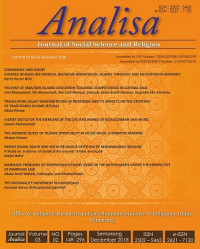
Artikel
Translating Salafi-Wahhābī books in Indonesia and its impacts on the criticism of traditional Islamic rituals
Penilaian
0,0
dari 5Indonesia is a country with the largest Muslim population in the world and a unique nation that has diversity of tribes, cultures and religions. This uniqueness invites many scholars to observe the religious rituals performed by Muslims in the country. However, scholars do not sufficiently examine the current heated debates about the permissibility of the sacred rituals of Indonesian Muslims. This paper discusses undertakings in translating Arabic books by Indonesian Salafi-Wahhābī scholars and its impact on the increasing criticism against the various rituals practiced by traditional Muslims represented by Indonesian who mainly affiliated to the largest socio-religious organization in Indonesia, Nahdlatul Ulama (NU; the Awakening of Religious Scholars). Using the content analysis, this paper concludes that according to Salafi scholars, the rituals practiced by traditionalist Muslims such as slametan, tahlilan, manakiban and pilgrimage to local Islamic graves are regarded as heretic in the Islamic perspective. On the contrary, according tothe traditionalist Muslims, these rituals, indeed, have a strong foundation in Islam. Facing the Salafi attacks, traditionalist Muslims make various efforts to defend their position and to protect their members from the Salafi influence and criticism. The sharp disagreements between Salafis and traditionalist Muslims are due to a different method in understanding Islam. The former tend to be more puritanical and textual, while the latter tend to be more contextual and adaptive to local wisdom. However, the differences of opinion rarely cause physical conflicts at the grassroots level as Indonesians Muslims have a long experience in maintaining harmony within society.
Ketersediaan
Tidak ada salinan data
Informasi Detail
- Judul Seri
-
-
- No. Panggil
-
J 297.27 Ana
- Penerbit
- Semarang : Office of Religious Research and Development, Ministry of Relious Affairs Semarang., 2018
- Deskripsi Fisik
-
hal. 189-205
- Bahasa
-
English
- ISBN/ISSN
-
2502-5465
- Klasifikasi
-
297.27
- Tipe Isi
-
-
- Tipe Media
-
-
- Tipe Pembawa
-
-
- Edisi
-
Analisa Vo. 3 No. 2, Desember 2018
- Subjek
- Info Detail Spesifik
-
https://blasemarang.kemenag.go.id/journal/index.php/analisa/article/view/648
- Pernyataan Tanggungjawab
-
-
Versi lain/terkait
Tidak tersedia versi lain
Lampiran Berkas
Komentar
Anda harus masuk sebelum memberikan komentar
 Karya Umum
Karya Umum  Filsafat
Filsafat  Agama
Agama  Ilmu-ilmu Sosial
Ilmu-ilmu Sosial  Bahasa
Bahasa  Ilmu-ilmu Murni
Ilmu-ilmu Murni  Ilmu-ilmu Terapan
Ilmu-ilmu Terapan  Kesenian, Hiburan, dan Olahraga
Kesenian, Hiburan, dan Olahraga  Kesusastraan
Kesusastraan  Geografi dan Sejarah
Geografi dan Sejarah